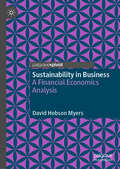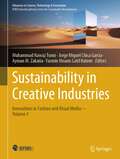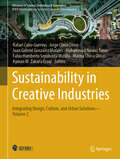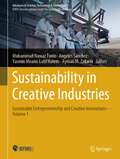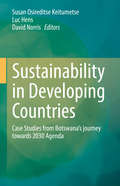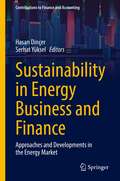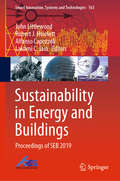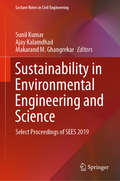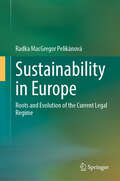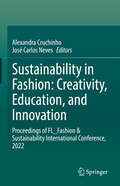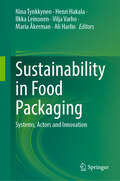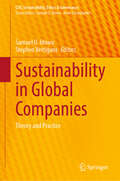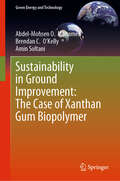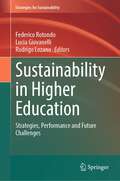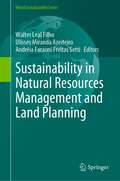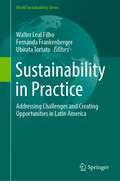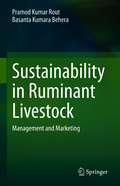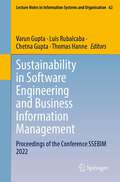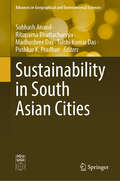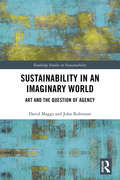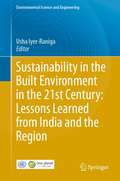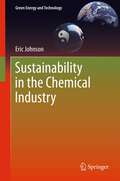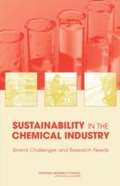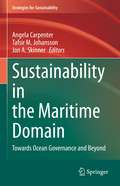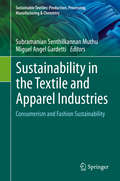- Table View
- List View
Sustainability in Business: A Financial Economics Analysis
by David Hobson MyersThis book provides an approach to sustainable decision-making rooted in financial and economic literature. Financial economic techniques have the power to frame the discussion of sustainability to explain who, how, and why sustainability is a growing phenomenon in business and investing. Financial concepts in a sustainable framework provide a theoretical basis to approach research and business questions on sustainability. The framework provides for a better understanding of the different definitions of sustainability and the role those differences have on decisions that will lead to the future of sustainable business. A future which relies on growth driven by expanding its markets’ reach (demographics), its innovation or creation of new products, and its capital structure (leverage). Third party certification and governmental regulation become the constraints on that growth as well as the proof of sustainable growth. Finally, the ability and methods for investors to support sustainable growth is addressed in a modern portfolio theory analysis.
Sustainability in Creative Industries: Innovations in Fashion and Visual Media—Volume 3 (Advances in Science, Technology & Innovation)
by Muhammad Nawaz Tunio Yasmin Moanis Latif Hatem Ayman M. Zakaria Jorge Miguel Chica GarciaIn this volume, sustainable creative industries become a beacon for innovative change, forging a path towards a conscious, harmonious world. This volume offers a panoramic view of the future, where innovations in fashion and visual media blend seamlessly with a commitment to a more sustainable and impactful world. More specifically, this volume explores the compelling interplay of sustainability, creativity, and advocacy, casting a spotlight on the transformative potential within fashion and visual media. It embarks on a journey through the innovative landscapes of fashion, where sustainability takes center stage, through an exploration of genderless mode development, contemporary patterns, and reimagined design strategies that breathe new life into tradition. As readers explore the chapters within, the symbiotic relationship between visual media and sustainability emerges, further delve into the evolution of visual communication design and the potency of Instagram microblogs in shaping perceptions and awareness. Furthermore, the role of design in disseminating critical information during disasters is unveiled and the ways in which narrative methods can ignite meaningful change explored.
Sustainability in Creative Industries: Integrating Design, Culture, and Urban Solutions—Volume 2 (Advances in Science, Technology & Innovation)
by Muhammad Nawaz Tunio Jorge Chica-Olmo Rafael Cano-Guervos Juan Gabriel González Morales Fabio Humberto Sepúlveda Murillo Marina Checa Olivas Ayman M. Zakaria EraqiThis book discusses the dynamic interplay of creativity and sustainability in the realm of design, offering a captivating exploration of innovative practices and their environmental impact. From biomimetic inspirations to biophilic designs, it unveils a spectrum of ideas in sustainable architecture. It further dives into inclusive and creative designs, social sustainability for the elderly amid the pandemic. This book casts a spotlight on the intricate synergy between preserving cultural heritage and fostering creative industries. It explores the profound significance of architectural lighting, the innovative reinterpretation of traditional motifs, and the enduring allure of heritage design within its chapters, creating an engaging and thought-provoking journey. Moreover, it ventures into the Integration of Creative Design in Urban Planning, presenting a futuristic outlook that seamlessly blends technology, sustainability, and human-centric solutions. Designed for a wide audience, including professionals, educators, and students, this book is a compelling resource for those passionate about the intersection of creativity and sustainability. It offers thought-provoking ideas, informative case studies, and a glimpse into the future of design that transcends boundaries.
Sustainability in Creative Industries: Sustainable Entrepreneurship and Creative Innovations—Volume 1 (Advances in Science, Technology & Innovation)
by Muhammad Nawaz Tunio Angeles Sánchez Yasmin Moanis Latif Hatem Ayman M. ZakariaThis book discusses a compelling array of topics at the intersection of entrepreneurship, education, and technological innovation within the creative industries. It delves into a captivating exploration of sustainable entrepreneurship in Part 1, where key characteristics of sustainable entrepreneurs and factors influencing entrepreneurial intention are dissected. By unearthing the nexus between entrepreneurial alertness, networking capability, and venture performance, it provides intriguing insights into sustaining traditional crafts and brands amid the COVID-19 pandemic. The following parts not only unveil current innovative pedagogical strategies in creative design education but propels you into the future, exploring the harmonious fusion of academia and industry in sustainability-driven programs. Designed for educators, students, researchers, and practitioners in entrepreneurship, design, and technology fields, this book offers a transformative journey into sustainable practices, innovative pedagogies, and cutting-edge advancements. Engaging, informative, and thought-provoking, it is a must-read for those seeking to shape the future of creative industries through entrepreneurship, education, and innovation.
Sustainability in Developing Countries: Case Studies from Botswana’s journey towards 2030 Agenda
by Susan Osireditse Keitumetse David Norris Luc HensThis book illustrates an alternative approach to ‘state of sustainability’ reporting by presenting cross-sectoral and multi-disciplinary discussions on sustainability issues in the context of a developing country, Botswana. The book volume illustrates how academic publishing can supplement African governments' existing forms of reporting on sustainability by providing on-ground detailed descriptions and experiences relating to achievement of the various sustainable development goals (SDGs). In addition, this process involves, increases and enhances diversity of stakeholders that report on sustainability. Furthermore, the approach resonates with the UN’s recommendation to build local strategies for implementation of the 2030 agenda for sustainable development. Conventional reporting on sustainability by most African countries is an exercise that is customarily the preserve of designated government ministries. While this form of reporting provides a consistent platform for tracking sustainable development goals, it can also benefit from juxtaposition with in-depth descriptions and experiences provided by academic publishing. Academia, through publishing, provides a framework for on-ground situation-analysis as well as in-depth descriptions of African country’s grass-root experiences, thus allowing for temporal tracking of sustainable development milestones. As this volume illustrates, experiences from the various contributors on this volume highlight different points of departure towards achieving the 2030 agenda. Topics covered include biodiversity, water management, world heritage, environment, education, tourism, gender, institutional approaches to achievement of SDGs, as well as contribution of non-governmental organisations (NGO)'s amongst others.
Sustainability in Energy Business and Finance: Approaches and Developments in the Energy Market (Contributions to Finance and Accounting)
by Hasan Dinçer Serhat YükselThis edited volume seeks to identify the sustainability issues currently affecting the energy business and finance. For this purpose, a broad range of perspectives on sustainability issues in the energy business and finance are taken into consideration in the context of renewable business projects. In turn, several novel strategies from the energy business and finance are illustrated with regard to sustainable organizational factors, technological infrastructure, financial facilities, economic development, and investment potential. Comparing and contrasting different sustainability perspectives can help to develop the most appropriate and successful business strategies for the sustainable energy business and finance. This book presents multidimensional analyses of sustainability issues with regard to renewable energy projects and identifies the most promising strategies, as well as efficient market conditions for the energy business.
Sustainability in Energy and Buildings: Proceedings of SEB 2019 (Smart Innovation, Systems and Technologies #163)
by Lakhmi C. Jain Robert J. Howlett John Littlewood Alfonso CapozzoliThis volume contains the proceedings of the 11th KES International Conference on Sustainability and Energy in Buildings 2019 (SEB19) held in Budapest, 4th -5th July 2019 organised by KES International in partnership with Cardiff Metropolitan University, Wales, UK. SEB-19 invited contributions on a range of topics related to sustainable buildings and explored innovative themes regarding sustainable energy systems. The aim of the conference was to bring together researchers, and government and industry professionals to discuss the future of energy in buildings, neighbourhoods and cities from a theoretical, practical, implementation and simulation perspective. The conference formed an exciting chance to present, interact, and learn about the latest research and practical developments on the subject. The conference attracted submissions from around the world. Submissions for the Full-Paper Track were subjected to a blind peer-review process. Only the best of these were selected for presentation at the conference and publication in these proceedings. It is intended that this volume provides a useful and informative snapshot of recent research developments in the important and vibrant area of Sustainability in Energy and Buildings.
Sustainability in Environmental Engineering and Science: Select Proceedings of SEES 2019 (Lecture Notes in Civil Engineering #93)
by Sunil Kumar Ajay Kalamdhad Makarand M. GhangrekarThis book consists of select peer-reviewed papers from the International Conference on Sustainable Environmental Engineering and Science (SEES) 2019. The main focus of the book is to propose sustainable technologies to address the growing environmental challenges. The contents cover several topics of relevance such as air pollution, solid waste management, wastewater treatment, industrial pollution, and suggests eco-friendly and cost-effective techniques to tackle them. Given the range of topics covered, the book will be useful to researchers and professionals working in the multidisciplinary area of sustainability.
Sustainability in Europe: Roots and Evolution of the Current Legal Regime
by Radka MacGregor PelikánováThis book analyses the roots and evolution of the concept of sustainability in Europe and the European Union. As sustainability has always mirrored certain value judgments on justice and priorities, it is suitable for functionalist, analytical, contextual and historical comparisons via multidisciplinary studies combining various branches of the social sciences, law, philosophy, and economics. The aim of this book is to explore the roots and evolution of sustainability, so as to reveal how a European style of sustainability has emerged, one that is inextricably linked to our civilization and history. It identifies linear and cyclical phases with clear trends toward expanding the reach of sustainability, its subjects and their duties. The book offers a multidisciplinary, chronological and contextual overview of the evolution of sustainability until the 21st century, while also addressing its legal regime. Sustainability has many faces and needs to be approached in a dynamic manner through the lens of sustainable development or via a multi-stakeholder model that includes private subjects and corporate social responsibility. Although primarily intended for an audience with an advanced background in law, economics and philosophy, the book will also benefit a more general audience, particularly those who want to learn where the current sustainability concerns and legal regime actually came from.
Sustainability in Fashion: Proceedings of FL_Fashion & Sustainability International Conference, 2022
by Alexandra Cruchinho José Carlos NevesSustainability in Fashion: Creativity, Education, and Innovation is a book that focuses on how sustainability can be integrated into the fashion and clothing industry. The set of chapters provides peer-reviewed research covering a wide range of topics, mainly focused on how sustainability can be incorporated into fashion and textile education, how consumer behaviour and marketing affect sustainability in fashion (and vice versa) and how circular economy principles can be incorporated into clothing and textile supply chains. The chapters in this proceedings volume examine sustainability not only from the perspective of academia, but also from the perspective of industry. Working across sectors in this manner can facilitate the development of real projects that can greatly contribute to sustainability in the fashion industry.
Sustainability in Food Packaging: Systems, Actors and Innovation
by Henri Hakala Nina Tynkkynen Ilkka Leinonen Vilja Varho Maria Åkerman Ali HarlinThe sustainability of food packaging is a key priority in the food industry, as plastic waste and littering have become global concerns. Packaging waste accounts for over half of total global waste, predominantly from single-use plastic food packaging. Production of packaging consumes significant natural resources and contributes to climate change and pollution. However, packaging is also crucial for reducing food waste, protecting food safety, and providing vital information about contents, making it an essential sustainability solution, not just a problem. Sustainability Transition in Food Packaging: Systems, Actors, and Innovation explores sustainable food packaging from an interdisciplinary perspective, integrating economics, environmental science, technology, social sciences and cultural studies. This broad approach expands beyond the traditional focus on packaging as a product, considering its content and the services it provides. While sustainable packaging is often defined by four principles—effectiveness, efficiency, circularity, and safety—current applications primarily focus on the packaging itself, overlooking broader impacts such as marine and soil littering. Life cycle assessments (LCA) of packaging frequently ignore social, cultural, and economic sustainability aspects and often fail to account for the diverse interpretations of LCA standards. While the Product Environmental Footprint (PEF) offers a uniform solution, challenges remain due to undefined packaging category rules. Food packaging is rapidly evolving, driven by innovation, political action, and consumer demand. Given the global and varied nature of the food supply chain, one-size-fits-all solutions are insufficient. This book offers a holistic, interdisciplinary approach to sustainability, fostering dialogue and research across different research fields. It examines different conceptualizations of sustainable food packaging including methods for analyzing sustainability. The volume introduces novel methodologies, such as LCA with a focus on littering, and provides insights on overcoming the challenges of transitioning to a more sustainable food packaging system.
Sustainability in Global Companies: Theory and Practice (CSR, Sustainability, Ethics & Governance)
by Samuel O. Idowu Stephen VertigansThis textbook focuses on how sustainability is practiced in companies in different sectors of the global economy - examples include aviation, banking, energy, financial services, food, manufacturing, technology, transportation, and tourism. These corporate sectors are at the forefront of the debate around business and sustainability both in their usage of finite resources and their potential to deliver meaningful solutions. Consequently, several experts were brought together for this book and asked to focus on how sustainability is understood and practiced in different companies around the globe in terms of the UN Sustainable Development Goals 2030. Chapters incorporate theoretical and applied examples that can help improve levels of insight into international business approaches. They provide opportunities to learn and disseminate factors that are delivering short, medium, and long-term solutions and problems. These insights can incorporate the spectrum of activities required inorder to achieve sustainability through industrial processes, supply chains to consumer behavior. The multi-disciplinary nature of the fundamental issues also prompted a diverse selection of academics and practitioners across disciplines who have knowledge and/or experiences of sustainability and international business theories, practices, and processes. Students and academics from across related disciplines, corporations, policymakers, and members of societies who study or have an interest in sustainable development will particularly find this book useful.
Sustainability in Ground Improvement: The Case of Xanthan Gum Biopolymer (Green Energy and Technology)
by Abdel-Mohsen O. Mohamed Brendan C. O’Kelly Amin SoltaniSustainable soil stabilization solutions aim to maintain a perfect balance between infrastructure performance and the social, economic and ecological processes required to sustain human equity, diversity, and the functionality of natural systems. To this end, biopolymers, either chemically synthesized from biological matter or biosynthesized by living organisms, are exhibiting great promise as a financially competitive and green alternative for conventional calcium-based binders. Recent experimental studies have shown that soils stabilized by polysaccharide-type biopolymers, such as xanthan gum (XG), exhibit a variety of promising physical and mechanical treatments, including improved water-retention capacity, reduced compressibility and hydraulic conductivity, enhanced shear strength, and improved resistance against wind/water erosion. Despite these advancements, the existing literature reveals numerous inconsistencies, and a thorough understanding of the behaviour/properties of XG-treated soils under diverse loading and environmental conditions remains somewhat elusive. More importantly, there remains a notable gap in understanding how different factors affect the interactions between XG and various soil types throughout the processes of mixing, curing, and later environmental exposure. This book represents the first of its kind, offering a comprehensive, fundamental overview of the current state of XG usage for sustainable ground improvement, while also identifying future research directions towards addressing existing gaps in knowledge and application.
Sustainability in Higher Education: Strategies, Performance and Future Challenges (Strategies for Sustainability)
by Rodrigo Lozano Federico Rotondo Lucia GiovanelliThis contributed volume addresses the issue of how higher education institutions can systematically reorient themselves to help society become more sustainable. In particular, a strategic management approach is used to overcome the fragmentation of sustainability initiatives increasingly conducted by higher education institutions worldwide. In this book, eminent scholars in the field of sustainability in higher education combine their different backgrounds to propose conceptual frameworks for interpreting and measuring sustainability integration in higher education institutions. The chapters contained herein explore which processes and management tools should be used, as well the challenges to be faced, to make sustainable innovation effective. The cases present in this volume offer a guide for higher education institution management to lead the sustainability transition.
Sustainability in Natural Resources Management and Land Planning (World Sustainability Series)
by Walter Leal Filho Ulisses Miranda Azeiteiro Andréia Faraoni Freitas SettiThis book includes contributions from scientists and representatives from government and non-governmental organisations working in the field of land management and use and on management of fires. The book is truly interdisciplinary and has both a research and application-oriented dimension. The list of topics includes sustainability and water management; sustainability and biodiversity conservation; the future sustainability of nature-based industries such as agriculture, mining, tourism, fisheries and forestry; sustainability, people and livelihoods; sustainability and landscapes planning; sustainability and land use planning; handling and managing forest fires. The papers are innovative and cross-cutting, and many have practice-based experiences. Also, this book, prepared by the Inter-University Sustainable Development Research Programme (IUSDRP) and the World Sustainable Development Research and Transfer Centre (WSD-RTC), reiterates the need to promote a sustainable use of land resources today.
Sustainability in Practice: Addressing Challenges and Creating Opportunities in Latin America (World Sustainability Series)
by Walter Leal Filho Fernanda Frankenberger Ubirata TortatoSustainability is now a widely spread concept, and much progress has been achieved since the 1970s, when it started to be widely discussed. At present, many international organizations and scientists are active in implementing sustainable development as a whole and the UN Sustainable Development Goals (SDGs) in particular. Nevertheless, the main research agenda is being led by some countries, providing a good opportunity for other nations and regions which have not yet been so active, to bring their viewpoints to the global discussion. One of these regions is Latin America. Consistent with the need for more cross-sectorial and cross-cultural interactions among the various stakeholders working in the field of sustainability in Latin America and beyond, this book pursues two main aims: a) to provide research institutions, universities, NGOs, government agencies, and enterprises from the region with an opportunity to present their works in the field of sustainability and b) to document and promote ideas and experiences acquired in the execution of sustainability projects, especially successful initiatives and good practice across the Latin America region. Last but not least, a further aim of the book is to present methodological approaches and experiences deriving from case studies and projects, which aim to show how sustainability may be enhanced in practice.
Sustainability in Ruminant Livestock: Management and Marketing
by Basanta Kumara Behera Pramod Kumar RoutThis book presents a concept for implementing a mass balance approach toward developing an effective eco-friendly, livestock farming system independent of external energy input. In this context it describes a modern, integrated farming system, and includes comprehensive technical information explaining the design and evaluation of manure management systems, and modeling and operational tools. It first discusses the mass balance operating process, highlighting the difference between imported and exported mass across the farm boundary. Estimating mass balance can provide critical information for (comprehensive) nutrient management planning and for managing the movement of nutrients and manure. It then explains the estimation of whole-farm P mass balance using a suitable model system. The subsequent chapters provide updated information on management aspects of livestock-farming and generation of multiple job opportunities, and also explore various aspects of livestock farming operational protocols like housing and management; nurture of rams, ewes and lambs, new born calves and heifers; care of buck, doe and kid- nutrition flushing; concept zero grazing-systems; disease control and management; integrated goat farming; and crop-livestock integration. Further, the book addresses crop-livestock integration; energy autonomy in cattle farming; value added biopharmaceuticals from cattle farming; CAPEX for cattle farming; concepts of cattle farming; detrimental effects of the industry; topographic and edaphic factors, and thermal stress on livestock growth and development; socioeconomic development; and water requirements for livestock. The book concludes with the most important issue in the field of agriculture and veterinary science: “Livestock Farming with Care,” describing sustainable, eco-friendly livestock farming by highlighting issues like animal feed vs. human food; agricultural GDP vs livestock, and factors affecting the sustainability of livestock farming. Given its scope, this book is a valuable resource for researchers and students alike, and will also appeal to practitioners in the field of livestock.
Sustainability in Software Engineering and Business Information Management: Proceedings of the Conference SSEBIM 2022 (Lecture Notes in Information Systems and Organisation #62)
by Thomas Hanne Varun Gupta Chetna Gupta Luis RubalcabaThe proceedings volume presents selected papers from the International Conference on Sustainability in Software Engineering & Business Information Management: Innovation & Applications (SSEBIM 2022) held in Olten, Switzerland from September 23-24, 2022. It includes research related to sustainability from both a business and technical point of view. From a business perspective, it not only addresses how to make the business operations more sustainable, but also considers factors such as human values, ethics, environment and responsibility of the businesses. From the technical perspective of software development companies, it focuses on sustainability in software engineering ranging from practices, tools, techniques and methods. The contributions reflect how software engineering teams exhibited pro-activeness in their approaches to lead to sustainable development of the software that is of highest quality and reliability.It is intended for a broad audience, including students, researchers and practitioners who work in software engineering and business information management fields.
Sustainability in South Asian Cities (Advances in Geographical and Environmental Sciences)
by Subhash Anand Rituparna Bhattacharyya Pushkar K. Pradhan Madhushree Das Tulshi Kumar DasThis book explores some of the common socio-economic and environmental challenges faced by the cities of South Asia, which remain highly under-researched. South Asia comprises eight nations—India, Bangladesh, Nepal, Sri Lanka, Bhutan, Maldives, Pakistan, and Afghanistan, consisting of a total population of 1.92 billion in 2022. The majority of the cities in these countries are characterized by haphazard urbanization and multi-dimensional poverty alongside its associated ingredients— floods, water scarcity, food crises, poor sanitation, slums and squatter settlements, and pollution, among others. This comprehensive book is contributed by interdisciplinary scholars and includes 25 case studies. The volume brings these socio-economic and environmental challenges to the fore for a better and more nuanced understanding. The book help policymakers to mitigate the challenges and build sustainable cities.
Sustainability in an Imaginary World: Art and the Question of Agency (Routledge Studies in Sustainability)
by John Robinson David MaggsSustainability in an Imaginary World explores the social agency of art and its connection to complex issues of sustainability. Over the past decade, interest in art’s agency has ballooned as an increasing number of fields turn to the arts with ever-expanding expectations. Yet just as art is being heralded as a magic bullet of social change, research is beginning to throw cautionary light on such enthusiasm, challenging the linear, prescriptive, instrumental expectations such transdisciplinary interactions often imply. In this, art finds itself at a treacherous crossroads, unable to turn a deaf ear to calls for help from an increasing number of ostensibly non-aesthetic fields, yet in answering such prescriptive urgencies, jeopardizing the very power for which its help was sought in the first place. This book goes in search of a way forward, proposing a theory of art aiming to preserve the integrity of arts practices within transdisciplinary mandates. This approach is then explored through a series of case studies developed in collaboration with some of Canada’s most prominent artists, including internationally renowned nature poet Don McKay; Italian composer and Head of Vancouver New Music, Giorgio Magnanesi; the renowned Electric Company Theatre, led by Kevin Kerr; and finally through a largescale multimedia installation aiming to reimagine the relationship between climate, culture, and human agency. Sustainability in an Imaginary World will be of great interest to students and scholars of arts-based research fields, sustainability studies, and environmental humanities.
Sustainability in the Built Environment in the 21st Century: Lessons Learned from India and the Region (Environmental Science and Engineering)
by Usha Iyer-RanigaThis book follows on previous works addressing sustainable development research in the Asia-Pacific region. It mainly focuses on India, a country currently facing immense challenges in the form of climate change, rapid urbanisation, and population pressures in its journey to help achieve the Sustainable Development Goals. Expecting to surpass China in terms of population in the near future, India needs to develop its own solutions in order to uphold its commitments under the Paris Agreement. This book makes a contribution in that direction by presenting case studies on various aspects of the built environment, from education to managing cities, procurement, and considerations for a circular economy. The papers gathered here offer a vital resource for government policymakers, educators, and current and future professionals, equipping them with the knowledge and expertise they need in order to overcome today’s complex challenges in the built environment.
Sustainability in the Chemical Industry
by Eric JohnsonIt's the new rock and roll. It's the new black. Sustainability is trendy, and not just among hipsters and pop stars. The uncool chemical sector helped pioneer it, and today, companies inside and outside the sector have embraced it. But what have they embraced? Surely not the Brundtland definition of meeting "the needs of the present without compromising the ability of future generations to meet their own needs." Sustainability describes a change in the chemical industry's approach to the external world: to regulators, to greens, to neighbors, to investors and to the general public. Displacing the adversarialism of the 1970s-80s, sustainability is a new approach to social/political conflict, and an attempt to rebuild the industry's long-suffering public image. In practice, it consists of: A 'stakeholder' approach to communications and external relations A rebranding of regulatory compliance and risk management, with the emphasis on their benefits to stakeholders Recognition (and even celebration) of the opportunities, not just the costs, of environmental and social protection The core of this book is a survey of the world's 29 largest chemical companies: how they put sustainability into action (six of the 29 do not), and the six 'sustainability brands' they have created. It begins with a history of stakeholders conflict, before looking at various definitions of sustainability - by academics, by the public and by investors. After the survey and analysis, the book covers sustainability and 'greenwash' plus the ROI of sustainability, and it gives five recommendations.
Sustainability in the Chemical Industry: Grand Challenges and Research Needs
by Committee on Grand Challenges for Sustainability in the Chemical IndustryThrough innovative design, creation, processing, use, and disposal of substances, the chemical industry plays a major role in advancing applications to support sustainability in a way that will allow humanity to meet current environmental, economic, and societal needs without compromising the progress and success of future generations. Based on a workshop held in February 2005 that brought together a broad cross section of disciplines and organizations in the chemical industry, this report identifies a set of overarching Grand Challenges for Sustainability research in chemistry and chemical engineering to assist the chemical industry in defining a sustainability agenda. These Grand Challenges include life cycle analysis, renewable chemical feedstocks, and education, among others.
Sustainability in the Maritime Domain: Towards Ocean Governance and Beyond (Strategies for Sustainability)
by Angela Carpenter Tafsir M. Johansson Jon A. SkinnerThis volume explores options for a sustainable maritime domain, including maritime transportation, such as, Maritime Spatial Planning (MSP), maritime education and training, maritime traffic and advisory systems, maritime security. Other activities in the maritime domain covered in the book include small-scale fisheries and sustainable fisheries, and greening the blue economy. The book aims to provide the building blocks needed for a framework for good ocean governance; a framework that will serve through the next decade and, and hopefully, well beyond the 2030 milepost of the UN Agenda for Sustainable Development. In short, this book brings together the problems of the current world and sustainable solutions that are in the development process and will eventually materialize in the not so distant future. Additionally, the book presents a trans-disciplinary analysis of integral sustainable maritime transportation solutions and crucial issues relevant to good ocean governance that have recently been discussed at different national, regional and international fora, highlighting ongoing work to develop and support governance systems that facilitate industry requirements, and meet the needs of coastal states and indigenous peoples, of researchers, of spatial planners, and of other sectors dependent on the oceans.The book will be of interest to researchers across many disciplines, especially those that are engaged in cross-sectoral research and developments in the maritime transport sector and across the wider maritime domain. To this end, the book covers areas including natural and social sciences, geographical studies, spatial planning, maritime security and gender studies, as they relate to transport and the wider maritime sector. In addition, the book explores frameworks for sustainable ocean governance being developed under the UN’s Agenda for Sustainable Development to 2030. It will also look beyond the 2030 milepost under that Agenda, and will be of use to national and international policymakers and practitioners, government actors at the EU and other regional and national levels and to researchers of ocean governance, sustainability and management, and maritime transport.
Sustainability in the Textile and Apparel Industries: Consumerism and Fashion Sustainability (Sustainable Textiles: Production, Processing, Manufacturing & Chemistry)
by Subramanian Senthilkannan Muthu Miguel Angel GardettiThis book is part of a five-volume set that explores sustainability in textile industry practices globally. Case studies are provided that cover the theoretical and practical implications of sustainable textile issues, including environmental footprints of textile manufacturing, consumer behavior, eco-design in clothing and apparels, supply chain sustainability, the chemistry of textile manufacturing, waste management and textile economics. The set will be of interest to researchers, engineers, industrialists, R&D managers and students working in textile chemistry, economics, materials science, and sustainable consumption and production. This volume focuses on sustainability aspects of consumerism and fashion, emphasizing the environmental issues that stem from textile care and disposal, and how many of these practices detrimentally impact the environment. Also addressed is the role of consumer knowledge and behavior associated with the clothing industry that may exacerbate these issues, and what can be done to better inform consumers about more sustainable options available to them. The case studies presented cover environmental and social sustainability in the clothing industry, and sustainable development in luxury fashion networks.
